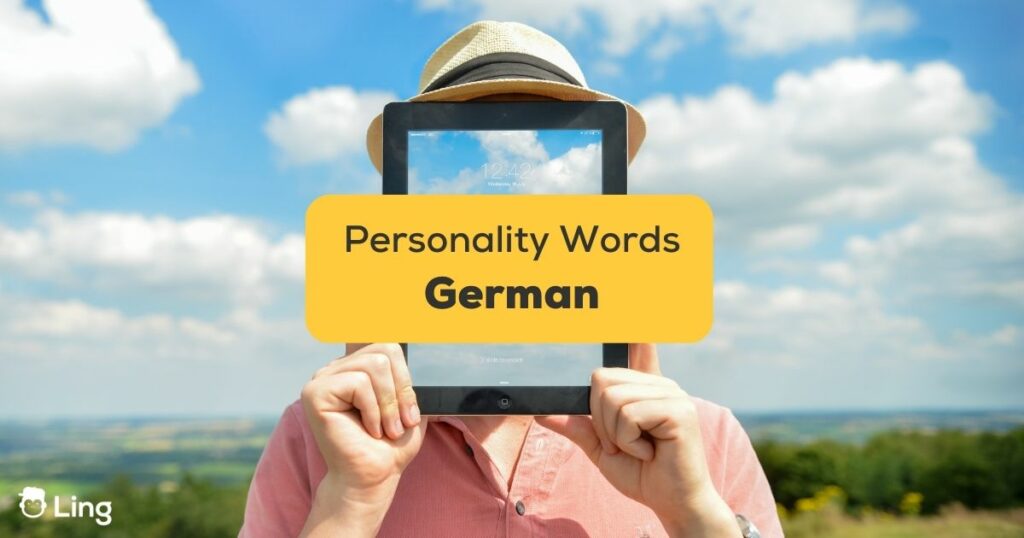Feeling weary from the monotony of everyday vocab drills? We hear ya! It’s time to break free from the norm and add some spice to your language journey. How about we shake things up a bit with a fun challenge by learning the personality words in German instead? If you’re up for that, then keep reading!
Imagine you’re at a bustling coffee shop in Berlin, sipping on a creamy latte. A stranger strikes up a conversation. You feel a spark, and suddenly you’re lost in a chat about life, dreams, and people. But wait, how would you describe your eccentric artist friend back home or your overly-enthusiastic gym buddy in German? You might know your “Guten Morgen” from your “Guten Nacht,” but when it comes to delving deeper into personalities, you’re at a loss for words!
Don’t worry!
This is where we step in to help you navigate the vast and colorful labyrinth of German personality words. From the most delightful positive traits to the downright grumpiest negative ones and the neutrals that lie somewhere in between, we’ve got you covered. After all, these are not just words – they are the golden keys to unlocking a more nuanced understanding of the German language and culture and, importantly, painting vivid mental portraits of the people around you.
Ready to learn more? Then you’ve got to stick around and read the sections below!

Common Personality Words In German
Why does learning personality words in German matter, you might wonder? The answer lies in their versatility. These words help us express our thoughts, feelings, and observations about ourselves and others, contributing significantly to our everyday conversations. If you’re learning German, a good understanding of these terms can enhance your language skills and help you connect with native speakers on a deeper level.
Basically, personality words can be broadly classified into positive, negative, and neutral categories. Understanding these categories can help you select the right words to describe a person accurately.
Positive Personality Traits
Positive personality traits are like sunshine on a cold day – they light up conversations and bring warmth to descriptions. In German, there’s a myriad of words to portray individuals in a favorable light. They can help you articulate the qualities you admire in others, express your own strengths, or set personal development goals. Some of these words might even resonate with you on a personal level, reflecting your own attributes.
| English | German |
|---|---|
| Friendly | freundlich |
| Honest | ehrlich |
| Funny | lustig |
| Helpful | hilfsbereit |
| Reliable | zuverlässig |
Negative Personality Traits
Negative personality traits, while not as pleasant as positive ones, are equally essential in painting a complete and honest picture of a person. These words can help you express difficult situations or uncomfortable encounters in German. Understanding these words not only expands your vocabulary but also equips you with the linguistic tools to navigate complex social scenarios.
| English | German |
|---|---|
| Lazy | faul |
| Mean | gemein |
| Rude | unhöflich |
| Arrogant | arrogant |
| Selfish | egoistisch |
Neutral Personality Traits
Neutral personality traits occupy the middle ground between the positive and negative spectrums. They provide us with a language to describe individual characteristics without casting a value judgment. These words come in handy when you want to depict someone’s personality accurately without implying anything good or bad. They offer an unbiased, matter-of-fact way to talk about people’s behavior or demeanor.
| English | German |
|---|---|
| Shy | schüchtern |
| Quiet | ruhig |
| Thoughtful | nachdenklich |
| Talkative | gesprächig |
| Stubborn | stur |

Advanced Personality Words In German
When you’re diving into the world of a new language, it’s essential to understand the depth of specific words and their connotations. Let’s expand our knowledge about the categories we’ve discussed before and plunge into the heart of some specific German personality words. By grasping these words, we’ll be one step closer to mastering the beautiful language of German.
Positive Personality Words
Positive words paint a person in a favorable light, describing traits that are typically regarded as good or beneficial. Here, we’ll explore a few common positive personality words in German. Each of these words tells a story, reflecting a quality that adds value to a person’s character.
| English | German |
|---|---|
| Courageous | mutig |
| Ambitious | ehrgeizig |
| Respectful | respektvoll |
| Diligent | fleißig |
| Patient | geduldig |
Negative Personality Words
The negative personality words in German, like those in any language, are necessary to give a holistic view of someone’s character. While they may not describe the most admirable traits, they are essential for honest and clear communication. Let’s unfold a few negative personality words to enrich your German vocabulary.
| English | German |
|---|---|
| Annoying | unangenehm |
| Jealous | eifersüchtig |
| Greedy | gierig |
| Impatient | ungeduldig |
| Pessimistic | pessimistisch |
Neutral Personality Words
Neutral personality words are essential tools in our linguistic kit, helping us to describe people without imparting judgment. These words are not inherently good or bad but give us an insight into a person’s characteristics. Let’s delve into a few of these words in German.
| English | German |
|---|---|
| Careful | sorgfältig |
| Mysterious | geheimnisvoll |
| Creative | kreativ |
| Introverted | introvertiert |
| Extraverted | extrovertiert |
Basic Sentence Patterns For Describing Yourself And Others
Now that we’re armed with a wealth of personality words in German, it’s time to learn how to weave them into sentences. After all, knowing words is one thing, but using them in context is what language mastery is all about! This section provides you with some basic sentence patterns that can help you describe both yourself and others in German.
Describing Yourself
When it comes to self-description, you will frequently use the first-person pronoun “ich” (I) along with “bin” (am) which is a form of the verb “sein” (to be). Here’s a structure you can follow:
Ich bin + [Personality Word].
For example:
- Ich bin freundlich. (I am friendly.)
- Ich bin kreativ. (I am creative.)
- Ich bin ungeduldig. (I am impatient.)
Describing Others
While describing others, you would use the pronouns “er” (he), “sie” (she), or “es” (it) along with “ist” (is) which is also a form of “sein.” Here’s the structure:
Er/Sie/Es ist + [Personality Word].
For example:
- Er ist ehrgeizig. (He is ambitious.)
- Sie ist introvertiert. (She is introverted.)
- Es ist geheimnisvoll. (It is mysterious.)
You can also use names in place of pronouns. For example, “Anna ist geduldig.” (Anna is patient.)
Want To Learn German?
And there we have our complete guide on German personality words! As you reach this part of the post, we hope that you’ll be able to use these in real-life conversations. Remember, By regularly practicing these sentence structures with the personality words you’ve learned, you’ll find yourself becoming more and more fluent in describing personalities in German.
Now if you’re truly keen to actually master this language, then you’ve got to try out the Ling app!
Ling is an educational resource developed specifically to help you learn German and 60+ other languages. No matter what level you’re currently at, you can get a leg up thanks to its advanced features and gamified instructional approach. Ready to give it a try? Sign up for a FREE account and download it from the App Store or Play Store to get started! Trust us – this will become your newest favorite!
































































